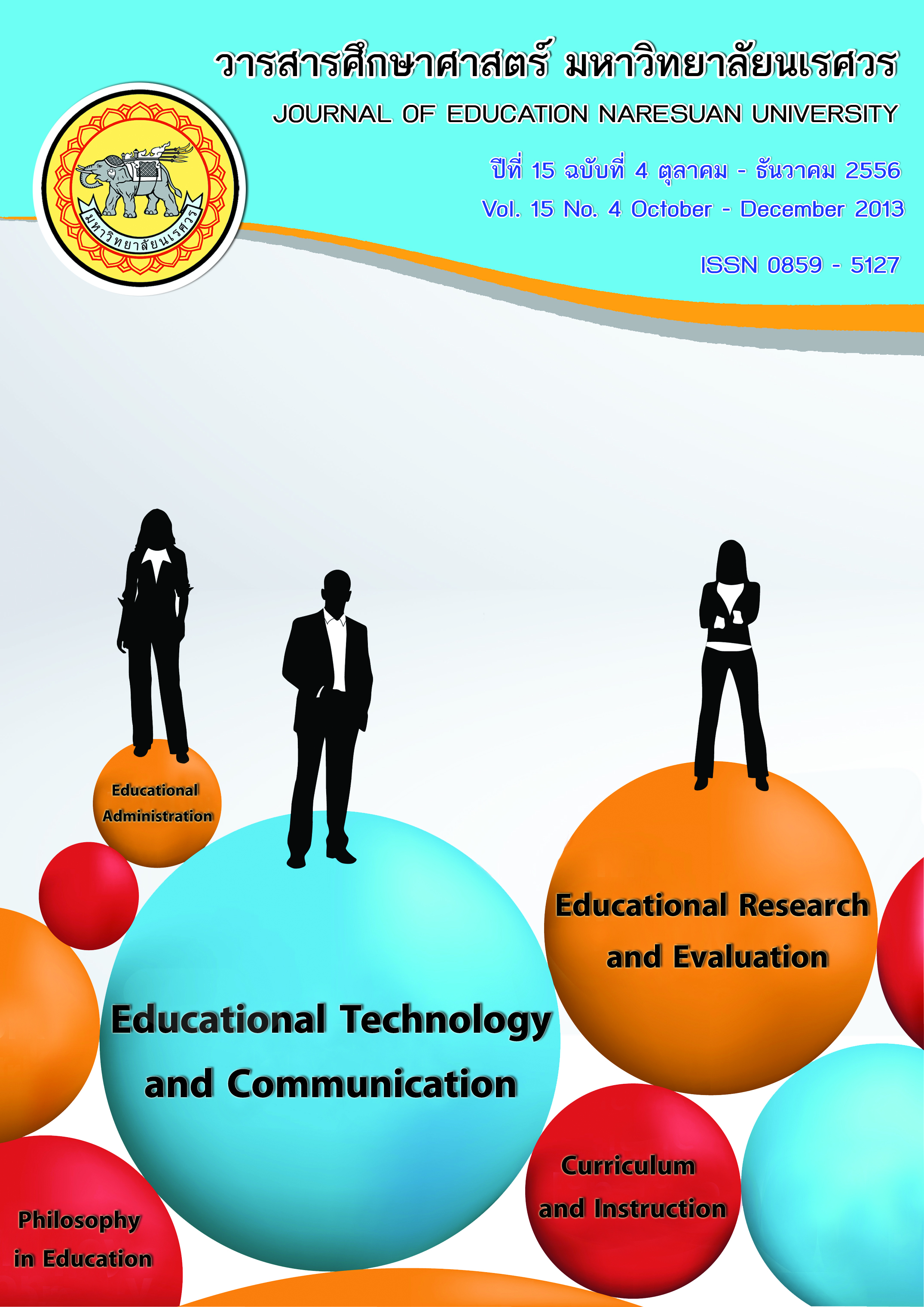การพัฒนารูปแบบการจัดการเรียนรู้ของครูในโรงเรียนขนาดเล็ก
Main Article Content
Abstract
บทคัดย่อ
การวิจัยครั้งนี้มีวัตถุประสงค์เพื่อ 1) เพื่อศึกษาแนวทางการจัดการเรียนรู้ของครูต้นแบบในโรงเรียนขนาดเล็ก 2) เพื่อสร้างและหาคุณภาพของรูปแบบการจัดการเรียนรู้ของครูในโรงเรียนขนาดเล็ก 3) เพื่อทดลองใช้รูปแบบการจัดการเรียนรู้ของครูในโรงเรียนขนาดเล็ก 4) เพื่อประเมินรูปแบบการจัดการเรียนรู้ของครูในโรงเรียนขนาดเล็ก ดำเนินการพัฒนารูปแบบการจัดการเรียนรู้ของครูในโรงเรียนขนาดเล็กโดยการวิเคราะห์แนวคิดทฤษฎีที่เกี่ยวข้องกับการจัดการเรียนรู้ที่เน้นผู้เรียนเป็นสำคัญและสัมภาษณ์เชิงลึกแนวทางการจัดการเรียนรู้ของครูต้นแบบ วิเคราะห์ข้อมูลที่ได้มาสร้างเป็นรูปแบบการจัดการเรียนรู้ของครูในโรงเรียนขนาดเล็ก ตรวจสอบคุณภาพโดยผู้ทรงคุณวุฒิ นำไปทดลองใช้กับกลุ่มเป้าหมายซึ่งเป็นโรงเรียนขนาดเล็กในเขตภาคเหนือตอนล่าง จำนวน 5 โรงเรียน ประเมินรูปแบบการจัดการเรียนรู้ของครูในโรงเรียนขนาดเล็กโดยผู้มีส่วนเกี่ยวข้อง
ผลการวิจัย
1) แนวทางการจัดการเรียนรู้ที่เน้นผู้เรียนเป็นสำคัญของครูต้นแบบในโรงเรียนขนาดเล็ก คือ การจัดการเรียนรู้แบบบูรณาการโดยใช้ภาษาไทยเป็นแกน จัดการเรียนรู้แบบร่วมมือและการใช้สื่อการเรียนรู้ ประกอบด้วย 3 ขั้นตอน ได้แก่ขั้นเตรียมการก่อนการจัดการเรียนรู้ ขั้นจัดกิจกรรมการเรียนรู้ และขั้นประเมินผลการเรียนรู้
2) รูปแบบการจัดการเรียนรู้ของครูในโรงเรียนขนาดเล็ก ประกอบด้วย 3 ขั้นตอน ได้แก่ ขั้นเตรียมการ ขั้นจัดการเรียนรู้ และขั้นประเมิน ในขั้นตอนจัดการเรียนรู้ประกอบด้วยขั้นตอนย่อย ได้แก่ ขั้นนำเข้าสู่บทเรียน (introduction) ขั้นกิจกรรม (activities) ขั้นดูแลกำกับ (monitoring) ขั้นแนะนำช่วยเหลือ (mentoring) ขั้นสรุปและสะท้อน (conclusion & reflection)
3) ผลการทดลองใช้รูปแบบการจัดการเรียนรู้ของครูในโรงเรียนขนาดเล็ก 5 โรงเรียน พบว่า มีการนำไปใช้ 2 แบบ คือ แบบบูรณาการทุกกลุ่มสาระการเรียนรู้ และแบบคละชั้น
4) ผลการประเมินรูปแบบการจัดการเรียนรู้ของครูในโรงเรียนขนาดเล็ก พบว่า ส่วนใหญ่รูปแบบการจัดการเรียนรู้ของครูในโรงเรียนขนาดเล็กมีความเหมาะสมมากที่สุด
คำสำคัญ: รูปแบบการจัดการเรียนรู้/ โรงเรียนขนาดเล็ก
Abstract
The purposes of this research were 1) to study the best practices of master teachers on small-sized schools 2) to develop an instructional model on small-sized schools and study its quality 3) to implement the instructional model on small-sized schools 4) to evaluate the instructional model on small-sized schools. The procedure of the development were ; 1) analyzing foundations on child-centered approach and in-depth interview about the best practices of master teachers on small-sized schools, 2) constructing the instructional model on small-sized schools from gathered information, 3) implementing the developed model by the 5 small-sized schools in lower-northern area and 4) evaluating the developed model by stakeholders.
The results of research were as follows:
1) The best practices of master teachers on small-sized schools are based on Integrated approach, cooperative approach and using materials. It comprised of 3 stages ; preparation stage, instruction stage and assessment stage.
2) The instructional model on small-sized schools comprised of 3 stages as follow : preparation, instruction and assessment. The instruction stage comprised of 5 steps as follow : introduction, activities, monitoring, mentoring and conclusion & reflection.
3) When the instructional model on small-sized schools was implemented in 5 schools. It was found that it was implemented in 2 types ; The instructional model on small-sized schools : Multi-content area integration and Multi-class.
4) The evaluation of the instructional model on small-sized schools, it was found that the instructional model on small-sized schools were most in the highest level.
Key words :
Article Details
The owner of the article does not copy or violate any of its copyright. If any copyright infringement occurs or prosecution, in any case, the Editorial Board is not involved in all the rights to the owner of the article to be performed.


